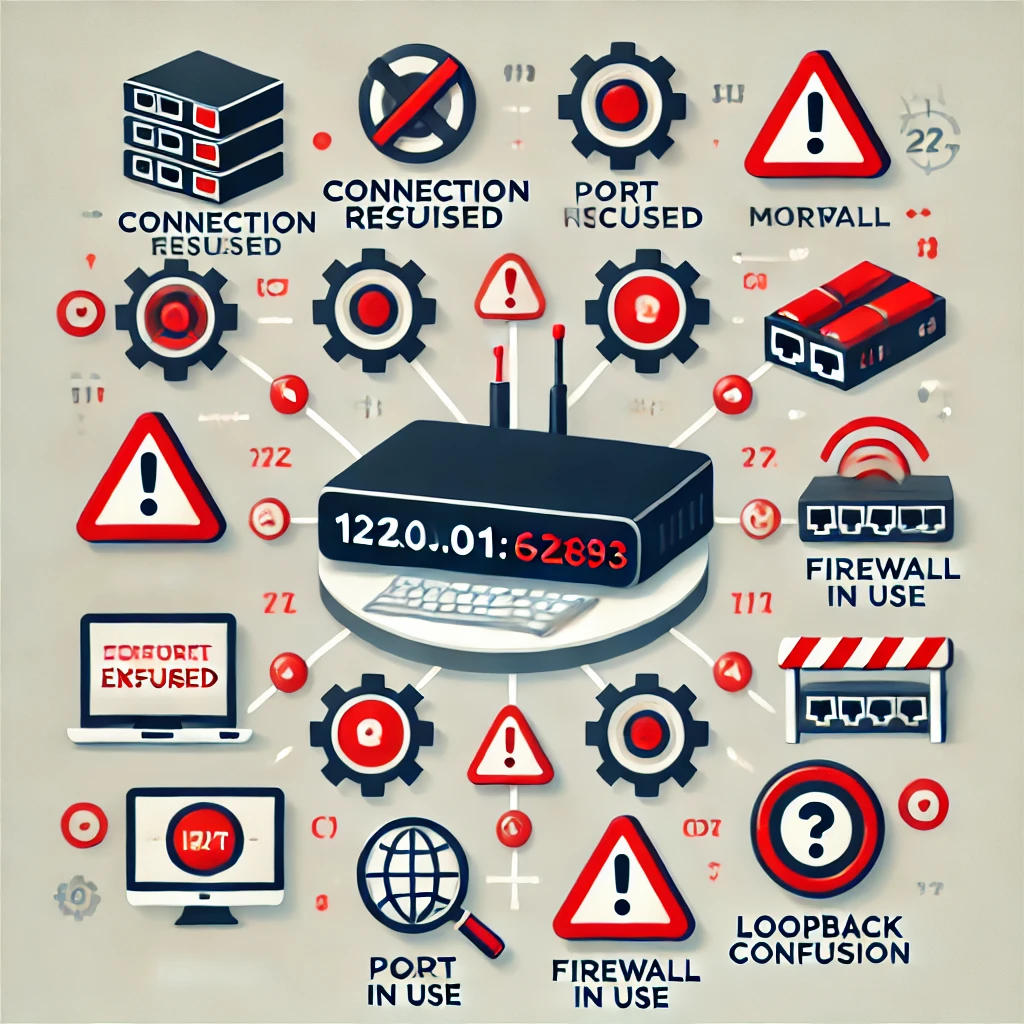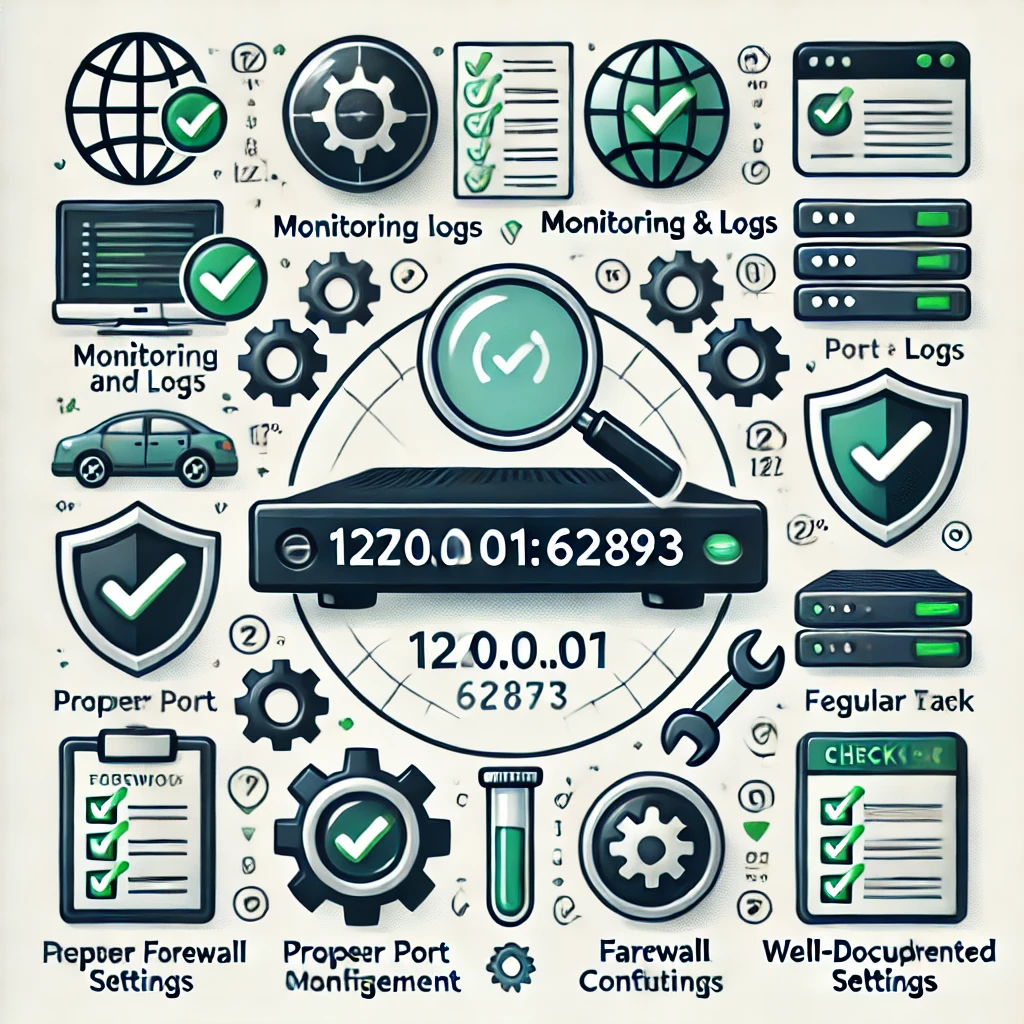127.0.0.1:62893 IP: Common Errors & 100% SOLVED Fixing Tips
The IP address 127.0.0.1 is commonly known as localhost, used in networking for local testing and development. Paired with port 62893, this configuration is often seen in development environments where specific ports are assigned for processes.
This article delves into 127.0.0.1:62893, explaining what it is, how it works, common errors, and how to troubleshoot any issues that arise.
What is 127.0.0.1:62893?

127.0.0.1 is the standard IP address for localhost. It’s a loopback address used by your computer to establish an internal network connection. Whenever you access 127.0.0.1, you’re connecting back to your own device instead of reaching an external network.
This is crucial for developers and IT professionals because it allows them to test services without exposing them to the internet.
When paired with a port, like 62893, it directs internal traffic to a specific application or service running on your machine. Ports are essential for differentiating services on the same device. In this case, 127.0.0.1:62893 refers to a service hosted locally on port 62893.
How Does the Loopback Address 127.0.0.1 Work?
The loopback address allows a computer to communicate with itself. Think of it as a closed circuit for network traffic—any data sent to 127.0.0.1 never leaves the local machine.
This address is used for testing and development, ensuring that network applications function properly without the need for an external network.
Port 62893 specifies the exact location on the localhost where a particular service or process is running, allowing for isolated testing and communication.
What are the Benefits of 127.0.0.1:62893?

How Efficient is Local Testing and Development?
One of the greatest benefits of using 127.0.0.1:62893 is for local testing. Developers often use localhost for testing new web applications, APIs, or other network services before making them publicly available.
Because 127.0.0.1 routes the traffic internally, there’s no need to expose the system to external risks. You can simulate network behavior and test specific processes on port 62893 without interference from other systems.
Enhanced Security in Development Environments
By using localhost, developers maintain a higher level of security. Traffic sent to 127.0.0.1 is isolated from the internet, which means malicious actors cannot access the data.
This isolation makes localhost the safest environment for testing new features or updates. Port 62893 can be configured for dedicated services or specific tests, ensuring that development activities remain contained and secure.
How 127.0.0.1:62893 Works?

The Role of IP Address 127.0.0.1 in Networking
In networking, 127.0.0.1 serves as a loopback address, which essentially means it allows your system to communicate with itself.
This IP is critical for testing network software, especially in development environments where external connections aren’t needed. Instead of reaching out to external servers, localhost ensures all traffic remains on your local machine.
Understanding Port 62893
A port is like a doorway for communication, allowing different services to talk to each other.
Port 62893 is one such doorway, and when it’s paired with 127.0.0.1, it directs all internal traffic to a specific application or service running on that port.
Each service on a computer has its own port number, and 62893 might be used for a custom application, making it essential for processes to remain separate from other services running on different ports.
Why Use 127.0.0.1:62893 in Network Configurations?

Common Use Cases for 127.0.0.1:62893
There are several scenarios where 127.0.0.1:62893 is commonly used:
- Web development: Localhost is a safe environment for testing web applications, ensuring that no real users or external networks are affected.
- API testing: Developers can test API responses locally before making them available to the public.
- Debugging: It’s easier to debug software locally using localhost since the traffic stays within the system, reducing variables.
In these cases, port 62893 is configured for specific processes, allowing seamless communication within the localhost environment.
How to Configure 127.0.0.1:62893 for Development
To configure 127.0.0.1:62893 for local development, follow these steps:
- Open firewall settings to ensure that localhost traffic isn’t blocked.
- Assign port 62893 to the service you’re testing.
- Edit your hosts file (if needed) to associate 127.0.0.1 with the correct local environment.
- Test connectivity to ensure the port is open and accessible using tools like
netstat.
Is it Safe to Use 127.0.0.1:62893?
Security of Using Localhost 127.0.0.1
Yes, localhost is safe to use. Since 127.0.0.1 keeps all network traffic within the local machine, it’s not exposed to external networks or potential cyber threats. This makes localhost an ideal environment for safely testing network services, web applications, and more.
Minimizing Risks When Using Port 62893
While using port 62893 on localhost is generally safe, there are still some steps to enhance security:
- Monitor local ports for suspicious activity.
- Ensure your firewall settings are properly configured to allow internal but restrict external access to 127.0.0.1.
- Use network monitoring tools to detect unusual traffic on port 62893.
What are the Common Errors with 127.0.0.1:62893?

What Causes 127.0.0.1:62893 Connection Issues?
The most common causes of connection issues with 127.0.0.1:62893 include:
- Port conflicts: If another application is already using port 62893, this can cause problems.
- Firewall blocks: If your firewall is blocking localhost traffic, this can lead to errors.
- Misconfigured network settings: Incorrect configuration of localhost can prevent successful connections.
How to Identify Port 62893 Errors?
To identify issues with port 62893, use the following tools:
- Netstat: This command-line tool will show which ports are being used and whether 62893 is occupied.
- Network analyzers: These can capture and inspect network traffic to help diagnose port-related issues.
How to Setup 127.0.0.1:62893?
Step-by-Step Guide to Setting Up 127.0.0.1:62893
Here’s how to set up 127.0.0.1:62893 for local development:
- Ensure the application is running on port 62893.
- Configure firewall settings to allow traffic through port 62893.
- Edit the hosts file if necessary to bind the service to localhost.
- Test the connection by accessing 127.0.0.1:62893 via a browser or a network tool.
Configuring Port 62893 for Network Testing
Once your application is running, configure port 62893:
- Use command-line tools to ensure the port is not in use.
- Adjust network settings to prevent conflicts with other services.
- Validate the configuration by sending requests to 127.0.0.1:62893 and checking the responses.
How to Fix Common 127.0.0.1:62893 Errors?

Troubleshooting Network Issues on 127.0.0.1
Here’s how to fix common errors:
- Check for port conflicts using the
netstatcommand to identify if port 62893 is already in use. - Adjust firewall rules to allow internal traffic through localhost.
- Reconfigure network settings to resolve loopback or misconfiguration issues.
How to Resolve Port 62893 Conflicts?
If port 62893 is in conflict with another application:
- Use a different port or reassign the conflicting process to a different port.
- Check logs for error messages indicating port-related issues.
- Restart network services to ensure all configurations are applied correctly.
How Can I Prevent Future Issues with 127.0.0.1:62893?
What are the Best Practices for Configuring Localhost and Ports?
To avoid future issues:
- Regularly monitor port usage to avoid conflicts.
- Keep firewall rules updated to allow safe traffic to localhost.
- Use consistent port assignments to ensure services don’t interfere with each other.
Using Monitoring Tools to Maintain Localhost Stability
Tools like Wireshark and Netstat can help monitor localhost activity, ensuring that services like 127.0.0.1:62893 run smoothly. Regular monitoring helps identify early signs of network issues and ensures a stable testing environment.
Conclusion
127.0.0.1:62893 is a useful configuration for local testing and development, providing a secure and isolated environment for running and troubleshooting network applications. While generally safe, it’s important to follow best practices in port management and network configuration to avoid conflicts and ensure a smooth experience.
By understanding the structure of localhost and the role of ports like 62893, developers can maximize the efficiency and security of their local environments.
Related Article: 127.0.0.1:49342 – What Is This IP, How It Works, Errors & Fixes [SOLVED]






